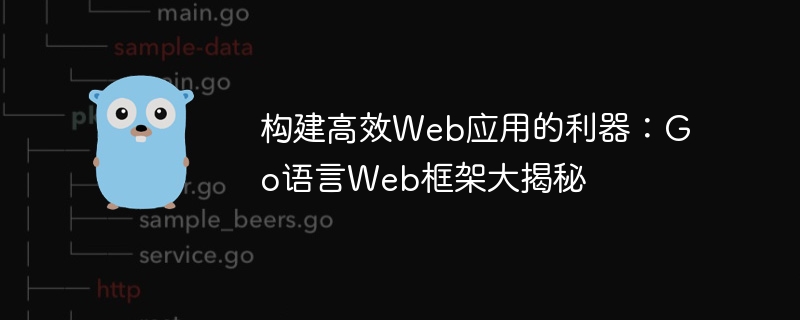Home >Backend Development >Golang >Reveal the secrets of the Go language Web framework and improve the efficiency of Web applications
Reveal the secrets of the Go language Web framework and improve the efficiency of Web applications
- PHPzOriginal
- 2024-01-31 15:40:061006browse

Go language web framework revealed: a powerful tool for building efficient web applications
Go language is an efficient, fast, and versatile programming language , favored by developers because of its concise syntax, powerful concurrency features and rich standard library. With the increasing popularity of Web applications, Go language has gradually become one of the preferred languages for building Web applications. This article will reveal the power of the Go language web framework and recommend some commonly used Go language web frameworks to help you build efficient and reliable web applications.
Advantages of Go language Web framework
- High performance: The Go language itself is known for its high performance, and the Go language Web Frames also inherit this feature. They typically use efficient networking libraries such as net/http that can handle large numbers of concurrent requests and provide low-latency response times.
- Simple and easy to use: The Go language web framework usually follows the KISS (Keep It Simple, Stupid) principle, with a simple API and easy-to-understand documentation. This allows developers to get started quickly and easily build feature-rich web applications.
- Rich ecosystem: The Go language has a large and active ecosystem, which contains many high-quality third-party libraries and tools. This allows developers to easily integrate various features into their web applications, such as database connectivity, authentication, caching, etc.
- Cross-platform support: Go language is cross-platform, which means that web applications written in Go language can run on a variety of operating systems, including Windows, Linux, macOS, etc. This allows developers to easily deploy their web applications to different environments.
Commonly used Go language Web framework
- #Gin: Gin is a very popular Go language Web framework. Known for its high performance, simple API and rich functionality. It supports multiple HTTP methods, middleware, routing, template engines, etc. Gin is very suitable for building high-performance web applications, such as API servers, microservices, etc.
- Echo: Echo is a lightweight, high-performance Go language web framework with a simple API and powerful scalability. It supports multiple HTTP methods, middleware, routing, template engines, etc. Echo is very suitable for building simple, lightweight web applications, such as blogs, static websites, etc.
- Buffalo: Buffalo is a full-stack Go language web framework with rich functions and powerful scalability. It supports multiple HTTP methods, middleware, routing, template engines, database connections, authentication, and more. Buffalo is very suitable for building complex, feature-rich web applications, such as e-commerce websites, content management systems, etc.
- Beego: Beego is a simple and easy-to-use Go language web framework with a simple API and rich functions. It supports multiple HTTP methods, middleware, routing, template engines, database connections, authentication, and more. Beego is very suitable for building simple, lightweight web applications, such as blogs, static websites, etc.
- Revel: Revel is a full-stack Go language web framework with rich functions and powerful scalability. It supports multiple HTTP methods, middleware, routing, template engines, database connections, authentication, and more. Revel is very suitable for building complex, feature-rich web applications, such as e-commerce websites, content management systems, etc.
How to choose a suitable Go language Web framework
When choosing a Go language Web framework, you need to consider the following factors:
- Project requirements: Choose an appropriate framework based on the specific needs of the project. For example, if you need to build a high-performance API server, Gin is a good choice; if you need to build a simple blog, Echo or Beego are more suitable.
- Development experience: If you are new to the Go language, choose a simple and easy-to-use framework, such as Echo or Beego. If you have extensive experience with the Go language, you can choose a more powerful framework such as Gin or Buffalo.
- Extensibility: If the project needs to support multiple functions, such as database connection, authentication, caching, etc., you need to choose a framework with rich extensibility, such as Buffalo or Revel.
- Community Support: Choose a framework with an active community so you can get timely help when you encounter problems.
Conclusion
The Go language Web framework provides developers with a tool for building efficient and reliable Web applications. By choosing the right framework and taking full advantage of the features it provides, developers can quickly and easily build feature-rich web applications. I hope this article will help you choose a suitable Go language web framework.
The above is the detailed content of Reveal the secrets of the Go language Web framework and improve the efficiency of Web applications. For more information, please follow other related articles on the PHP Chinese website!

